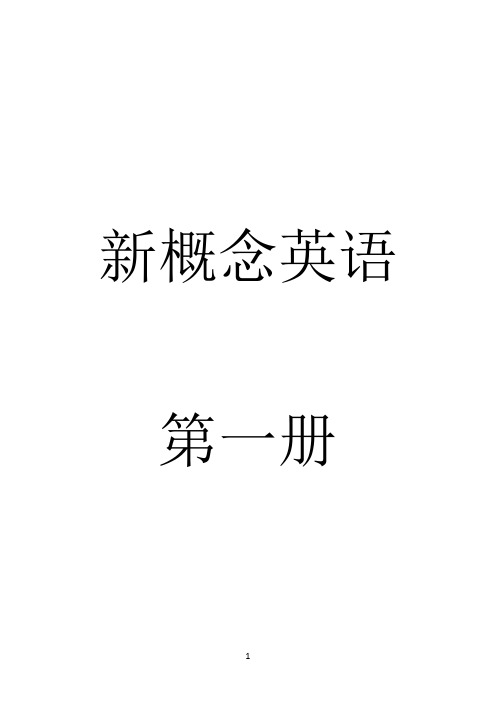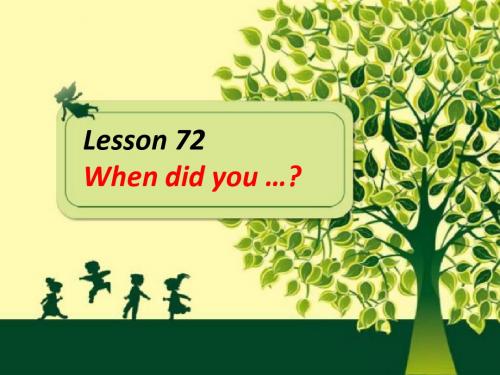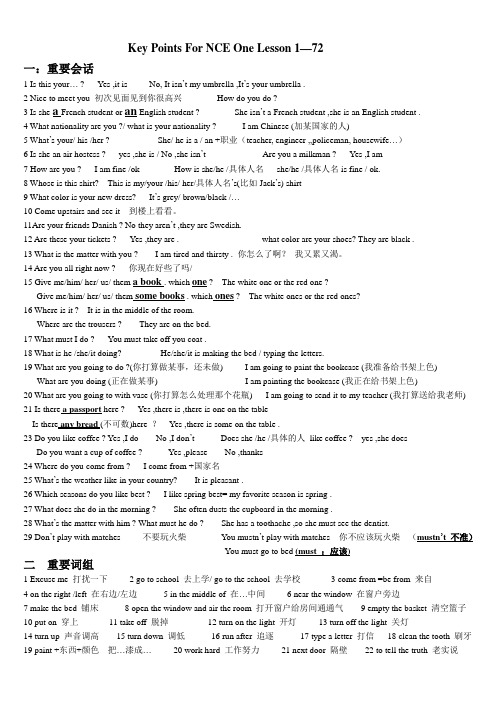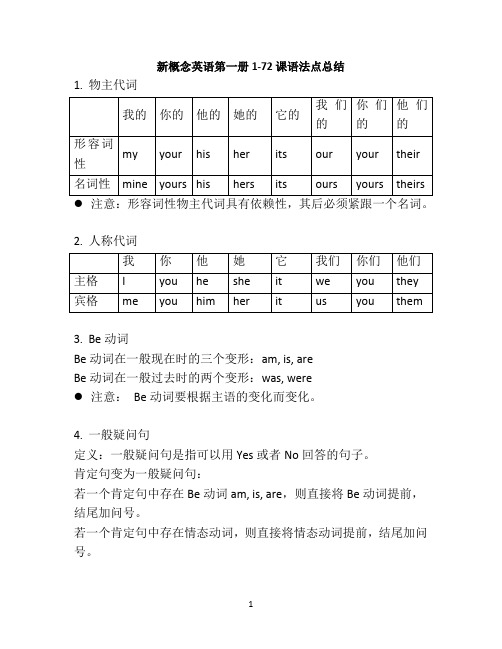新概念第一册1-72课语法总结和练习期中试题ppt课件
新概念第一册1-72课语法总结和练习期中试题【爆款】.pptPPT共36页

1、不要轻言放弃,否则对不起自己。
2、要冒一次险!整个生命就是一场冒险。走得最远的人,常是愿意 去做,并愿意去冒险的人。“稳妥”之船,从未能从岸边走远。-戴尔.卡耐基。
梦Байду номын сангаас境
3、人生就像一杯没有加糖的咖啡,喝起来是苦涩的,回味起来却有 久久不会退去的余香。
新概念第一册1-72课语法总结和练习期中 4、守业的最好办法就是不断的发展。 5、当爱不能完美,我宁愿选择无悔,不管来生多么美丽,我不愿失 去今生对你的记忆,我不求天长地久的美景,我只要生生世世的轮 回里有你。 试题【爆款】.ppt
66、节制使快乐增加并使享受加强。 ——德 谟克利 特 67、今天应做的事没有做,明天再早也 是耽误 了。——裴斯 泰洛齐 68、决定一个人的一生,以及整个命运 的,只 是一瞬 之间。 ——歌 德 69、懒人无法享受休息之乐。——拉布 克 70、浪费时间是一桩大罪过。——卢梭
新概念英语第一册1-72课语法点总结

新概念英语第一册新概念英语第一册1-72课语法点总结1.物主代词词。
2.人称代词3.Be动词Be动词在一般现在时的三个变形:am, is, areBe动词在一般过去时的两个变形:was, were●注意:Be动词要根据主语的变化而变化。
4.一般疑问句定义:一般疑问句是指可以用Yes或者No回答的句子。
肯定句变为一般疑问句:若一个肯定句中存在Be动词am, is, are,则直接将Be动词提前,结尾加问号。
若一个肯定句中存在情态动词,则直接将情态动词提前,结尾加问号。
若一个肯定句中存在实义动词,则直接在句首加助动词do/does/did,实义动词变原形,结尾加问号。
注意:一般疑问句一般读为升调。
例:Are you a teacher? 你是一名老师吗?肯定回答:Yes, I am. 否定回答:No, I am not.Do you like English? 你喜欢英语吗?肯定回答:Yes, I do. 否定回答:No, I don’t.5.特殊疑问句定义:不能用Yes或者No回答的句子。
构成:特殊疑问词+ 一般疑问句特殊疑问词:what(什么), when(何时), where(何地), who (谁), whom(谁宾格), whose(谁的), which(哪个), why (为什么), how(怎么样)口诀:非常八加一6.不定冠词a/an若单词是以“a, e, i, o”四个元音开头,其前面选用“an”;若单词是以元音字母“u”开头,视情况而定。
若其发音与“umbrella”中的“u”一致,则前面加“an”;若其发音与“university”中的“u”一致(即发字母本身音时),前面加“a”。
若单词是以辅音字母开头,一般前面用a。
特殊:an hour 一个小时;an honest boy 一个诚实的男孩若一个字母单独出现时,分如下情况:加an的字母:a, e, i, o(元音);x, r, s, l, n, f, m, h (辅音;口诀为“学而思送来那份美好”)例:There is an “m” in the word “umbrella”. 在单词umbrella里面有一个字母m。
最新2019-新概念英语第一册Lesson 72(共23张PPT)-PPT课件

today
this morning
yesterday
yesterday morning
the day before yesterday
the day before yesterday in the morning
this
yesterday the day before yesterday
What did she do the night before last ?
She telephoned her husband the night before last .
What did she do the night before last?
She telephoned her husband the night before last.
afternoon afternoon
in the afternoon
this evening
tonight
yesterday the day before yesterday
evening
in the evening
last night
the night before last
What did you do yesterday ?
What did the children do yesterday morning?
They played in the garden yesterday afternoon.
What did he do today ?
He stayed in the bed.
What did he do today? He stayed in the bed today.
新概念英语第一册1-72课期中测试

新概念第一册1-72课期中测试姓名:_________ 成绩:_________ 一、把下列名词变成复数( 8分)man _______ dress__________ watch______ foot__________ housewife_________ child________ potato_________ sheep_______二、写出下列词的反义词或者对应词( 8分)big______ fat_______ young ______ short _______busy________ late________ cold________ open ________三、写出下列词的现在分词、单三形式和过去式( 12分)go_______ _______ _______ have________ _______ _______do_______ _______ _______ eat_______ _______ _______四、用所给动词的适当形式填空( 14分)1. The boy__________(sit)under the tree now.2. What are you going to do?—I_____________(paint)the bookcase.3. It often____________(rain)in summer.4. Where does the girl________(come)from?—She _______from Beijing.5. There ________(be) some water in the bottle..6. There are some____________(policeman)in the park.7. I ________ (be) at school yesterday, but today I _________ (be) at home now.8. Look, the dog___________(run) after a cat.9. Mr. Black___________ (go)to work on foot last Friday.10. He always___________ (do) his homework at night.11. They _________ (like)play games in the park.12. He __________ (read) English yesterday morning.五、选择填空( 20分)( ) 1、_____ you _______ again last night ?A Do, telephoneB Did, telephoneC Do, telephonedD Did, telephoned( )2、Can she type this letter ___me ? A. of B at C for D in ( ) 3、I usually go to school _____7 o’clock _____the morning .A. in ;at B at ; in C on ;in D at ; on( )4、We usually stay _____home ____ Sundays.A. in, in B on, on C for , in D at, on( ) 5、My father often _____ to work ___car.A. go, by B goes , in C goes, by Dwent , by ( ) 6、_______ the moment they are ______under the tree.A. At , sit B At , sitting C In ,siting D In ,sitting ( ) 7、Look !He ______the radio.A. listening to B is listening C is listening to D listen to ( ) 8、Do you go to school _____bus or ____foot ?A by ,onB by ,byC on ,on Don ,by ( ) 9、There _____a desk and four chairs in the room yesterday.A areB wereC isD was( ) 10、What’s____ matter ____ you ?A / , toB with, toC the , withD / , with六、按要求改写句子( 12分)1. She goes to work by bus . (对划线部分提问)________________________________________________2. I go to school on foot . (同义句转换)______________________________________________3.There were hundreds of people in the race(一般疑问句)_________________________________________________4、She likes to plant flowers.(改为一般疑问句,并做否定回答)__________________________________________________5、My father is a worker. (对划线部分提问)_______________________________________________6.Tom does his homework at home.(否定句)_______________________________________________七、阅读理解( 10分)Jim comes from the U.S., He is now living in China. He gets up at about 6:30 and has breakfast at 7:00.He leaves home at 7:30. He usually walks to school. He has four lessons in the morning and two lessons in the afternoon. After class he usually plays football with his friends. He has supper at 6:00 and then does his homework and watch TV.( ) 1.Where is Jim from?A. AmericaB. EnglandC. ChinaD. Japan( ) 2.He has breakfast __.A. at 6:30B. at 7:00C. at 7:30D. at 7:55( ) 3.Jim is __.A. An English teacherB. a doctorC. a cleanerD. a student( ) 4.How does he usually go to school? ___.A.By busB. By bikeC. On footD. By train( ) 5. After supper he ___.A.goes to schoolB. does his homeworkC. goes to bed八、时间表达( 6分)5:00 3:308:15 10:051:45 9:56九、根据Spring’s Family Tree填空( 10分)I’m Lily. This is my family tree.Look! My grandfather and grandmotherhave 1.________ children. Jeff and Annare my 2. ________. Sandy is my aunt andI have 3. ________ aunts. May and Peterare my 4. ________. Do I have uncles? Yes, 5.________ is my uncle.。
(完整版)新概念第一册lesson1-72重要句型知识点及语法点

Key Points For NCE One Lesson 1—72一:重要会话1 Is this your… ? Yes ,it is No, It isn’t my umbrella ,It’s your umbrella .2 Nice to meet you 初次见面见到你很高兴How do you do ?3 Is she a French student or an English student ? She isn’t a French student ,she is an English student .4 What nationality are you ?/ what is your nationality ? I am Chinese (加某国家的人)5 What’s your/ his /her ? She/ he is a / an +职业(teacher, engineer ,,policeman, housewife…)6 Is she an air hostess ? yes ,she is / No ,she isn’t Are you a milkman ? Yes ,I am7 How are you ? I am fine /ok How is she/he /具体人名she/he /具体人名is fine / ok.8 Whose is this shirt? This is my/your /his/ her/具体人名’s(比如Jack’s) shirt9 What color is your new dress? It’s grey/ brown/black /…10 Come upstairs and see it 到楼上看看。
11Are your friends Danish ? No they aren’t ,they are Swedish.12 Are these your tickets ? Yes ,they are . what color are your shoes? They are black .13 What is the matter with you ? I am tired and thirsty . 你怎么了啊?我又累又渴。
(完整版)新一1-72课语法点总结

新概念英语第一册1-72课语法点总结1.物主代词2.人称代词3.Be动词Be动词在一般现在时的三个变形:am, is, areBe动词在一般过去时的两个变形:was, were●注意:Be动词要根据主语的变化而变化。
4.一般疑问句定义:一般疑问句是指可以用Yes或者No回答的句子。
肯定句变为一般疑问句:若一个肯定句中存在Be动词am, is, are,则直接将Be动词提前,结尾加问号。
若一个肯定句中存在情态动词,则直接将情态动词提前,结尾加问号。
若一个肯定句中存在实义动词,则直接在句首加助动词do/does/did,实义动词变原形,结尾加问号。
注意:一般疑问句一般读为升调。
例:Are you a teacher? 你是一名老师吗?肯定回答:Yes, I am. 否定回答:No, I am not.Do you like English? 你喜欢英语吗?肯定回答:Yes, I do. 否定回答:No, I don’t.5.特殊疑问句定义:不能用Yes或者No回答的句子。
构成:特殊疑问词+ 一般疑问句特殊疑问词:what(什么), when(何时), where(何地), who (谁), whom(谁宾格), whose(谁的), which(哪个), why(为什么), how(怎么样)口诀:非常八加一6.不定冠词a/an若单词是以“a, e, i, o”四个元音开头,其前面选用“an”;若单词是以元音字母“u”开头,视情况而定。
若其发音与“umbrella”中的“u”一致,则前面加“an”;若其发音与“university”中的“u”一致(即发字母本身音时),前面加“a”。
若单词是以辅音字母开头,一般前面用a。
特殊:an hour 一个小时;an honest boy 一个诚实的男孩若一个字母单独出现时,分如下情况:加an的字母:a, e, i, o(元音);x, r, s, l, n, f, m, h (辅音;口诀为“学而思送来那份美好”)例:There is an “m” in the word “umbrella”. 在单词umbrella里面有一个字母m。
新概念一Lesson-71-72(共35张PPT)

2020/5/15
★answer v. 接(电话) ① v. 对……作出反应;响应 answer the phone/telephone 接 电话 answer the door/doorbell 应声开 门 ② v. 回答;答复 answer a letter 回信 I don’t think you’ve answered my question.
in the race at the race
2020/5/15
短语检查
6. 在人群中 in the crowd
7. 在左边
on the left
8. 在15号车里 in car number 15
9. 在回家的路上 on the way home
2020/5/15
国家单词
1.英国的 English 5. 美国的 2.法国的 French American 3.德国的 German 6. 日本的 4.意大利的 Italian Japanese
2020/5/15
本课重点语法
注 意
一般过去式的几种基本句型
做
笔
1.) 肯定句:主语+过去式+其它
如:He telephoned me four times yesterday.
记
哦
2.) 否定句:主语+didn’t+动词原形+其它
!
如: He didn’t telephone me four times yesterday.
• four times, 4次。 time在英语中作不可数名 词时表示“时间”;作可数名词时表示“次 数”。请注意英语中次数的表示法:
新概念英语NCE1_lesson71-72(共13页)课件

• Yes, he did.
• He telephoned (telephone的适当形式) at nine o'clock.
• What did (do的适当形式) you say to him?
您身边的小升初英语专家----鑫鹏学校新概念部
课文再现-英汉互译
• He‘s awful!
• Then I arrived home at six o'clock
• 他讨厌透了!
• What's Ron Marston like, Pauline? • 朗·马斯顿是怎样一个人?
• He telephoned me four times yesterday,
• 前天打了3次。
• He telephoned the office yesterday morning and yesterday afternoon.
• 他昨天上午和下午把电话打到了我的办 公室,
• My boss answered the telephone • 是我的老板接的。
• He said,‘Pauline is typing letters. • 他说:“波琳正在打信,
• What did she do yesterday? • She aired the room yesterday.
• 1 they/ clean their shoes/ yesterday • 2 he/ open the box/ last night • 3 they/ sharpen their pencils/ this morning • 4 she /turn on the television/this evening
- 1、下载文档前请自行甄别文档内容的完整性,平台不提供额外的编辑、内容补充、找答案等附加服务。
- 2、"仅部分预览"的文档,不可在线预览部分如存在完整性等问题,可反馈申请退款(可完整预览的文档不适用该条件!)。
- 3、如文档侵犯您的权益,请联系客服反馈,我们会尽快为您处理(人工客服工作时间:9:00-18:30)。
10. Mike has two letters for him. 一般疑问句:否定句: 11. I usually play football on Friday afternoon. 否定句: 一般疑问句: 划线提问 12. Su Yang usually washes some clothes on
3. Gao Shan’s sister likes playing table tennis (改为否定句)
4. She lives in a small town near New York. (改为一般疑问句)
5. I watch TV every day. (改为一般疑问句) 6. David has got a football. 改为一般疑问句) 7. We have four lessons.(否定句) 8. Nancy doesn’t run fast (肯定句) 9. My dog runs fast. 否定句:一般疑问句: 8
19. We go to school every morning.(改为否定句)
20. He speaks English very well.(改为否定句)
21. I like taking photos in the park.(对划线部分提问)
22. John comes from Canada.(对划线部分提问)
新概念1--72课语 法总结及练习
1
一.一般现在时 表示一般性,经常性的 动作或一般性事实。
2
1、含有be动词的句子 He is a teacher.
★变疑问句将be动词移到句首 Is he a teacher?
★肯定回答及否定回答
Yes, he is. / No, he is not. ★变否定句在be动词后面加not
5
一般现在时的标志词
usually, sometimes, always, often,every day\month\ year, never,ever
6
1. We often_p_l_a_y__(play) in the playgound.
2. He usuallyg_e_t_s__(get) up at six o’clock.
3. D__o___youb_r_u_s__h_(brush) your teeth every
morning?
4. What (do)d_o__e_s__he usually (do)_d_o____ after
school?
5.Dannys_t_u_d_i_e(sstudy)English ,Chinese,Maths,
8. __D_o_e__s__ Mike__r_e_a_d___(read) English every 7 dn play football after school? (肯定回答)
2. I have many books. (改为否定句)
23. She is always a good student.(改为一般疑问句, 作否定回答)
24. Simon and Daniel like going skating.(改为否定 句)
10
二、现在进行时 表示现在正在进行的动作。 构成:主语+be动词+动词 的现在分词+其它成分
11
9
15. Daniel watches TV every evening.(改为否定句)
16. I do my homework every day.(改为一般疑问句, 并作否定回答)
17. She likes milk.(改为一般疑问句,并作肯定回答)
18. Amy likes playing computer games.(改为一般疑 问句,并作否定回答)
Science and Art at school.
6. Mike sometimes __g_o__e_s__(go) to the park with
his sister.
7. At eight at night, she _w_a_t_c_h__e_s__(watch) TV
with his parents.
肯定句:We are having lunch. ★变疑问句将be动词移到句首
Are you having lunch? ★变否定句在be动词后面加 not
We are not having lunch. ★特殊疑问句:what, which, how, where,
He is not a teacher. 3
2、不含be动词的句子,即含有一般动词的句子。 (1)第一、二人称及复数名词
I want to buy a new bike. ★变疑问句在句首加do Do you want to buy a new bike? ★肯定回答及否定回答 Yes, I do. / No, I don't. ★变否定句在主语和动词之间加don't. I don't want to buy a new bike.
4
(2)第三人称单数及单数名词 He likes reading books. ★变否定句在主语及动词之间加doesn‘t, 动词变 为原型, 原句中的动词不再有第三人称变化。
★He doesn't like reading books. 变疑问句在句首加does, 动词变为原型
Does he like reading books? ★肯定回答及否定回答: Yes, he does. / No, he doesn't.
Saturday. 否定句: 一般疑问句: 划线提问: 13. Mingming usually waters the flowers every
day 否定句: 一般疑问句: 划线提问 14. Tom does his homework at home. 否定句: 一般疑问句: 划线提问
